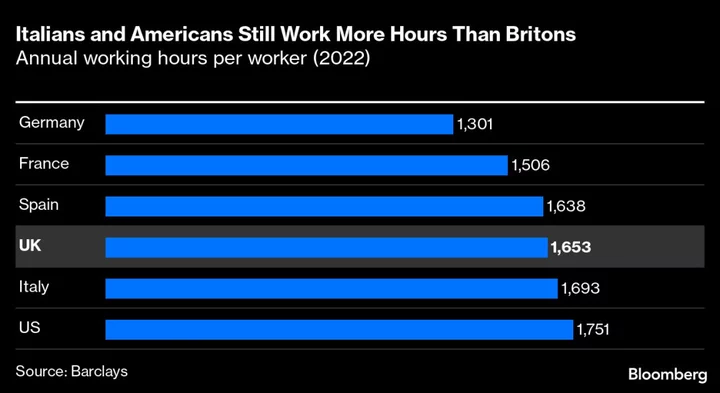British workers have missed out on a Europe-wide trend toward more leisure time and fewer hours on the job, compounding a miserable decade in which living standards stagnated.
Research from Barclays Plc shows working hours in the UK on have fallen 5% on average in the past four decades, with Britons now working 27% more hours on average than their German counterparts. France, Italy and Spain enjoyed at least a 10% decline in hours worked.
The figures show the impact of poor productivity in the UK, where the Bank of England and Treasury are concerned that poor levels of output per head are limiting prosperity and fueling a cost-of-living crisis. It suggests that any catch-up in leisure time for the UK would tighten a jobs market that’s already adding to inflation.
Barclays’s economists concluded that workers who reduced their hours enjoyed higher real wages because of gains in productivity. That could suggest that the struggle to boost pay in the UK since the financial crisis has meant that workers are not able to reduce their hours as they have in other countries.
“People want to enjoy more leisure time and work less,” said Silvia Ardagna, chief European economist at Barclays. “There is a pretty tight correlation between your demand for leisure and your income. The richer you become, the higher the wage, the more you have a preference to work less.”
The figures mark a reversal of fortunes for UK workers. At points in the 1970s, British workers enjoyed the fewest hours among the six Western economies studied — France, Germany, Italy, Spain, the UK and US.
Along with the US, the UK is a major outlier with little change in hours worked in the last 10 years. Those in other countries were able to eek out a more favorable work-life balance.
Britons on average were on the job just over 1,650 hours a year in 2022, down 5% since 1982. That’s still fewer hours than Italians and Americans. But the British have been overtaken in terms of leisure time by Germany, Spain and France in recent decades.
Germans worked just over 1,300 hours, and French staff close to 1,500 hours last year. That’s down 24% and 11% on 1982 levels, respectively. That may partly reflect higher holiday allowances across continental Europe than the US or UK have.
Americans earn much higher wages but suffered the longest hours. They worked 1,751 hours a year, down just 1.1% in four decades.
Ardagna said an aging workforce and this broader shift toward fewer working hours in most countries point toward continuing tightness in labor markets across Western economies.
Other research suggests that home working, the gig economy and more flexible hours could also allow for more leisure time in Europe. That may help lure into jobs older people and mothers with young children.
“The countries that saw the largest decrease in hours per worker — they also tend to see the largest increases in employment rates,” said Nicola Fuchs-Schündeln, an economics professor at Goethe University Frankfurt, who has published work on the issue. “Germany is a prime example.”
“This decrease in the fixed costs draws more of these marginal individuals into work,” she said. “So rather than fully retiring, maybe older individuals work part-time.”
Full-time workers may also reduce their hours “because they have more flexibility and they might have a person in the household who’s now working part-time and otherwise wouldn’t have worked at all,” said Fuchs-Schündeln.
“As real wages increase, we might see further decreases in hours per worker, but I would suspect that as the employment rate stops increasing at some point, then this decrease in hours per worker will be milder than it would be otherwise at least.”









